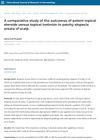 1 citations,
October 2013 in “BMJ”
1 citations,
October 2013 in “BMJ” A man's sudden hair loss and color change to white was diagnosed as alopecia areata and it improved on its own after six months.
 1 citations,
January 2013 in “Elsevier eBooks”
1 citations,
January 2013 in “Elsevier eBooks” The document reviews various hair and nail disorders, their causes, and treatments, emphasizing the need for proper diagnosis and the link between nail changes and systemic diseases.
 1 citations,
December 2010 in “InnovAiT”
1 citations,
December 2010 in “InnovAiT” The document concludes that accurate diagnosis and appropriate management are crucial for treating various hair disorders, which have significant psychological impacts.
 October 2024 in “Journal of Education Health and Sport”
October 2024 in “Journal of Education Health and Sport” Alopecia areata treatment should be personalized, using topical or systemic therapies based on severity, with promising options like JAK inhibitors needing more research.
 February 2024 in “International neuropsychiatric disease journal”
February 2024 in “International neuropsychiatric disease journal” Alopecia areata severely impacts quality of life, mental health, and work productivity.

New insights into cell communication in psoriasis suggest innovative drug treatments.
 February 2023 in “International Journal of Medical Arts”
February 2023 in “International Journal of Medical Arts” Trichloroacetic acid is a safe and effective treatment for hair loss in alopecia areata patients.
 May 2021 in “GSC Advanced Research and Reviews”
May 2021 in “GSC Advanced Research and Reviews” Hair color is influenced by genetics and can indicate certain health conditions.
 May 2020 in “JAAD case reports”
May 2020 in “JAAD case reports” Using anthralin and calcipotriene together might help treat tough cases of alopecia areata, but more research is needed to understand how it works.

The document is a detailed guide on skin conditions and treatments for dermatologists.
 October 2018 in “Springer eBooks”
October 2018 in “Springer eBooks” The document concludes that various topical medications are effective for skin conditions but often cause skin irritation as a side effect.
 August 2013 in “Actas Dermo-Sifiliográficas”
August 2013 in “Actas Dermo-Sifiliográficas” Most Cochrane Skin Group reviews are helpful for improving dermatology practices, but some lack enough evidence for clinical recommendations.
 June 2008 in “British Journal of Dermatology”
June 2008 in “British Journal of Dermatology” UK medical students lack dermatology education, liver biopsy patients with risk factors show more fibrosis, and certain fungi resist drugs due to melanin; genetics may influence female hair loss.

Betamethasone dipropionate lotion is more effective than minoxidil solution for treating Alopecia Areata.
 December 2019 in “International Journal of Research in Dermatology”
December 2019 in “International Journal of Research in Dermatology” Strong steroid cream works better than tretinoin cream for patchy scalp hair loss.
 January 2015 in “Indian Journal of Dermatology, Venereology and Leprology”
January 2015 in “Indian Journal of Dermatology, Venereology and Leprology” The document concludes that various skin conditions have specific characteristics and treatments, and highlights the importance of vitamin D in managing these dermatological issues.
 6 citations,
September 2012 in “Our Dermatology Online”
6 citations,
September 2012 in “Our Dermatology Online” Retinoids are effective for various skin conditions and hair loss but have serious side effects, so low doses are recommended.
 48 citations,
January 2015 in “Indian Journal of Dermatology, Venereology and Leprology”
48 citations,
January 2015 in “Indian Journal of Dermatology, Venereology and Leprology” Vitamin D is important for skin health and can help treat psoriasis, atopic dermatitis, and vitiligo.
40 citations,
October 2012 in “Dermatologic clinics” More research is needed to understand the genetic causes of Alopecia areata to develop better treatments.
29 citations,
November 2011 in “Cell stress & chaperones” Quercetin effectively treated and prevented hair loss in mice.
8 citations,
January 2013 in “International journal of trichology” Two people had unusual ring-shaped hair loss due to an autoimmune disorder.
4 citations,
January 2019 in “Indian Dermatology Online Journal” The term "Porokeratotic Adnexal Ostial Nevus" is suggested as a more appropriate name.
 3 citations,
December 2022 in “Cells”
3 citations,
December 2022 in “Cells” Cannabinoids like CBD and THC may help treat non-cancer skin diseases, but more research is needed.
1 citations,
January 2021 in “Skin appendage disorders” Alopecia areata in children is usually mild and effectively treated with strong topical steroids.
 October 2024 in “Asian Journal of Pharmaceutical and Clinical Research”
October 2024 in “Asian Journal of Pharmaceutical and Clinical Research” Topical methotrexate is more effective and as safe as betamethasone for treating alopecia areata.
 February 2024 in “Drug Delivery and Translational Research”
February 2024 in “Drug Delivery and Translational Research” A new liposomal formulation improves drug delivery and hair growth for treating hair loss without causing skin irritation.
 October 2023 in “The Cochrane library”
October 2023 in “The Cochrane library” The medicine baricitinib was found to notably improve hair regrowth in alopecia areata, but more research is needed on its side effects and other treatments.
 March 2022 in “Wound practice & research”
March 2022 in “Wound practice & research” New treatments for alopecia areata show promise, but standardized guidelines are needed.

Alopecia Areata is treated with drugs and therapies to reduce inflammation and immune response.
 36 citations,
September 2019 in “Journal of Herbal Medicine”
36 citations,
September 2019 in “Journal of Herbal Medicine” Herbal nano-formulations show potential for effective skin delivery but need more research.

























